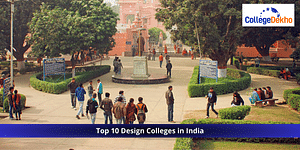Exhibition Design
About Exhibition Design
The design specialty of exhibition design necessitates a mastery of Narrative, Spatial Planning, Image Manipulation, Colour, Lighting, and Multimedia. In addition to an understanding of the audience and human factors, it also involves knowing of structures and typography. Both UG and PG options are available with some diploma courses for those interested in pursuing exhibition design. In order to pursue an undergraduate degree, a prospective student must have a 10+2 from an accredited board. A UG degree is required to enrol in a PG level course. In addition, depending on the requirements of the college, a minimum overall score is needed. In addition to degree programmes, those interested in exhibition design can enrol in diploma programmes. Popular diploma programmes in exhibition design include the Advanced Diploma in Event and Exhibition Design and the Diploma in Exhibition Design.
The specialisation of Exhibition Design is quite popular among design aspirants pursuing the stream at all levels. With design becoming a more and more sought after field of study and practice in the past few years, several of its branches and specialisations have come under the category of top choices of courses for students to build a career in. Exhibition Design is an amalgamation of several design disciplines which come together in order to communicate different aspects of ideas, information, and objects across three-dimensional environments.
Exhibition Design: Course Highlights
Check out the basic features of the Exhibition Design course below:
Parameter |
Detail |
|---|---|
|
Course Name |
Exhibition Design |
|
Course Stream |
Design |
|
Levels Available |
Diploma & Undergraduate Level |
|
Course Mode |
Online/ Offline |
|
Duration |
6 Months - 4 Years |
|
Exam Type |
Semester-wise |
|
Selection Process |
Merit or Entrance Exam based |
|
Fee Range |
INR 33,000 to INR 3,35,000 |
Why Choose an Exhibition Design Course?
Exhibition Design is a type of design course which provides students with the opportunity to learn and master their design skills in order to turn their passion into a professional career. Exhibition Design teaches students about various design disciplines that are necessary for success in the field of design. This course examines the process of designing exhibitions in the context of Museums, Cultural Collecting Institutions, and Heritage Agencies. It investigates contemporary innovative exhibitions, as well as their designs, technologies, audience development, project management, and stakeholder consultation.
Table of Contents
Exhibition Design Eligibility Criteria
Apart from possessing the required skill set that will help a candidate in pursuing the course of Exhibition Design, individuals are also required to have certain educational qualifications that make them eligible for the programme. The basic eligibility criteria for Exhibition Design courses have been listed below. It is necessary that students go through the set of eligibility conditions set for their desired course before they proceed to apply for it.
- The minimum educational requirement that candidates are required to have for admission to an undergraduate course in Exhibition Design is the higher secondary level. Students who have completed their class 12th or its equivalent from a recognised board of education can apply for the programmes at the bachelor level.
- The selection of candidates at the postgraduate level is done only after they have completed an undergraduate degree from a university that is approved and recognised by the University Grants Commission (UGC). Usually, students who have a bachelor's degree in design are considered eligible but some colleges also accept students from other disciplines and fields of study.
- For admission to the diploma level programmes in Exhibition Design, candidates are required to have completed their class 12th or the 10 + 2 level. Some diploma courses can be done only after obtaining a bachelor's degree in any stream.
- It is compulsory that the students score passing marks in all the exams of their qualifying degree and their aggregate marks should be at least 45 to 50 per cent.
- Apart from this, students must also check the eligibility criteria set by the institutes they target for taking admission. Some colleges have their individuals set of conditions for selecting applicants for the programme.
Exhibition Design Admission Process
The selection process for Exhibition Design courses varies from college to college. The general Exhibition Design admission process that is followed by most of the institutions has been listed below.
- Admission is given to candidates in some colleges through entrance exams that are held at the national or state level. Certain institutions accept the scores of these popular design entrance exams for selecting applicants for their programmes. NID DAT is one such entrance exam that provides admission to the Exhibition Design course.
- There are some design colleges that conduct their individual entrance exam that students have to appear for in order to secure admission at that college. These institute-level exams are accepted only at that particular institution.
- Candidates can get admission to some colleges directly on the basis of their merit in the qualifying degree. If they have cleared the cut-off marks set by the institute, they are given direct admission to the course.
- Some colleges admit students on a first come first serve basis. Candidates have to apply as quickly as they can at these institutes because they do not accept applications if their seats are full.
How to Apply for an Exhibition Design Course?
Most institutions now conduct their entire admissions process online. In order to start the application process, students must visit the official websites of the colleges to which they are applying. For offline enrollment, students can also visit the college of their choice and complete an application form including all required documents.
Exhibition Design Course Selection Process
Candidates are chosen in a merit-based selection process based on how well they performed academically in their 10+2 exams. Students must take the entrance exam for entrance-based selection. Once qualified, candidates are then eligible for the next stage of admission. The following admission steps differ from college to college. Once the application has been accepted, the college will typically require a final round of group discussions or a one-on-one interview before admission is finalised.
Exhibition Design Top Entrance Examination
Candidates for Exhibition Design must pass the entrance exams in order to enrol in the academic programme. The institution that conducts the entrance exam has the discretion to determine the necessary cut-off scores. Those who pass the entrance exam for exhibition design will receive an invitation to the final selection process. The following are a few of the most popular entrance exams for exhibition design:
- LPU NEST: The exam, administered by one of the most renowned private universities, is necessary to enrol in a design course at LPU. It is an annual exam that is taken at the university level. The university offers a wide range of other UG and PG courses in addition to design courses
- UCEED: Indian Institute of Technology, Bombay administers the Common Entrance Examination for Design at the undergraduate level. Students who want to enrol in a design course can choose to take this national level exam
- UPESDAT: The University of Petroleum and Energy Studies administers the university-level UPES Design Aptitude Test. Admission to a variety of undergraduate and postgraduate degree programmes is available through the exam
- DAIICT: The Dhirubhai Ambani Institute of Information and Communication Technology administers the DAIICT Design Aptitude Test. It is a college-level test that grants admission to different postgraduate degree programmes
- CEED: IIT Bombay's Indian Institute of Technology (IIT) conducts the Common Entrance Exam for Design (CEED). Students interested in pursuing a postgraduate degree in design must take a national exam. Online exam registration is available
Exhibition Design Syllabus
The course syllabus of an Exhibition Design course varies depending on the degree awarded upon completion of the course. Aside from that, the subjects/topics covered in an Exhibition Design course may differ from one college to the next. Some of the most common topics covered in an Exhibition Design course include:
Syllabus of Exhibition Design at the Undergraduate Level
The table given below provides a list of the basic subjects that are covered in any undergraduate degree of Exhibition Design.
Design Technology |
Design Practice |
|---|---|
|
Communication Skills |
Design Theory |
|
Colour Theory and Techniques |
Environmental Studies |
|
Basics of Interior Design |
Drawing (Technical) |
|
Cost Estimation |
Furniture Design |
|
Material Purchase |
Model Making |
Diploma of Exhibition Design Syllabus
The History of Fashion |
Design Thinking |
|---|---|
| Photography |
Fashion Forecasting |
| Fashion Styling |
Graphic Design |
| Fashion Consumer Behaviour |
Fashion Psychology |
| Visual Merchandising |
Retail and Brand Management |
| Packaging Design |
Fashion Journalism |
Advanced Diploma in Event and Exhibition Design Syllabus
| The World of Event Design | Event Design, An Overview |
|---|---|
| Design Elements |
Collateral Material |
| Event Styles |
Colour Code and Palette Techniques |
| Drafting |
Production |
| Site Selection |
Lighting |
| Details of Exhibition Design |
Wedding Events |
| Costing and Budgeting |
Corporate Events |
| Developing an Integrated Marketing Plan |
Customer Profiling |
| Centrepieces, Tabletops and Culinary Etiquettes |
Developing Initial Budget |
| Software: Auto CAD 2D |
Coordinate Event Elements and Requirements |
Exhibition Design Required Skills
To be successful in any career path, a specific set of skills is required. Exhibition design is an artistic field that requires a lot of imagination. Furthermore, an applicant must have a unique perspective on his or her surroundings. Aspirants in Exhibition Design must have an eye for detail and also be extremely creative. Candidates must possess the following skill-set in order to pursue a course and then make a career in the field of Exhibition Design:
Creativity and artistic taste |
Knowledge of colours, shades and tones |
|---|---|
|
Good communication skills |
Visual imagination |
|
Good observation |
Innovativeness |
|
Knowledge of market requirements |
Eye for detail |
|
Goal oriented |
Good at sketching |
Exhibition Design Career Options and Job Prospects
A candidate interested in exhibition design has a wide range of career options. Your potential for employment is heavily influenced by your skills and experience. Following completion of an exhibition design course, some career options are:
Product Designer |
Understanding a company's needs and creating products that meet those needs are the responsibilities of a product designer. The best user experience is the main goal of a product designer. |
|---|---|
|
Industrial Designer |
An industrial designer develops the concepts for industrial products after understanding the business requirements. They are in charge of fusing business, engineering, and the arts to produce. |
|
Interior Designer |
The interior design of a home or building is the responsibility of an interior designer. He or she can offer the client interior decorating for a building, but is not always in charge of an architect's duties. |
|
Textile Designer |
Designers of textiles are essential to the design process. They must learn about various dye compositions and conduct research on various kinds of fabrics. For knitted, woven, and mixed fabrics, they design patterns. |
Aspirants who successfully complete a UG-level course in exhibition design can choose to continue their education or even apply for a job position. After completing an exhibition design course, becoming an exhibition designer is the most sought-after job profile.
For trade shows, industry exhibitions, air shows, outdoor events, conferences, museum exhibits, showroom exhibits, etc., one hires an exhibition designer. An Exhibition Designer's job entails creating displays as well as fixtures for large exhibitions, businesses, shows, libraries, museums, and galleries. An Exhibition Designer is educated in the art of creating layouts and designs and is frequently hired to work for a museum, gallery, or private firm. Aside from the above-mentioned profile, aspirants should look into other popular design job profiles that they can pursue after finishing a Design course.
Exhibition Design Job Profiles
After completing a course in Exhibition Design, candidates are introduced to innumerable career prospects. Students also have the option of pursuing further higher studies in the same field if they are interested. Many popular job roles are offered to graduates with a degree in Exhibition Design. Becoming an Exhibition Designer is not the only career option that students have and they can easily venture other dimensions of the field as well.
Exhibition Designers are commonly hired for outdoor events, trade exhibitions, air shows, industry exhibitions, conferences, showroom displays, museum displays etc. The job profile of an Exhibition Designer is such that he/ she is required to create displays as well as fixtures for large exhibitions, shows, businesses, libraries, museums, and galleries. An Exhibition Designer is trained in the art of creating layouts as well as designs and are often hired to work for a museum, a gallery or even at a private firm. Some other job profiles that an individual can explore after completing an exhibition design course are as follows:
-
Textile Designer
-
Industrial Designer
Employment Areas after Exhibition Design
The areas where an individual can look out for a job after completing the Exhibition Design course are as provided below:
-
Museums
-
Private businesses
-
Libraries
-
Trade conferences
-
Galleries
-
Commercial public events.
Exhibition Design Average Salary
Any candidate's average pay is based on the knowledge and experience they have. After graduation and postgraduation, there are numerous employment options. Your chosen path will determine your average salary.
Below is a list of some of the important job roles and their respective average salaries:
Interior Designer |
INR 4 - 10,00,000 p.a. (approx.) |
|---|---|
|
Textile Designer |
INR 2.5 - 4,00,000 p.a. (approx.) |
|
Product Designer |
INR 5 - 11,00,000 p.a. (approx.) |
FAQs about Exhibition Design
What does an Exhibition Designer do?
Exhibition Design is a design specialty that necessitates expertise in spatial planning, narrative, image manipulation, color, lighting, and multimedia. It also necessitates an understanding of structures and typography, as well as an understanding of the audience and human factors.
What role does an exhibition designer perform in a gallery?
A person who designs fixtures and display stands for events like large public exhibitions, conferences, trade shows, and temporary displays for shops, museums, libraries, and art galleries is known as an exhibition designer.
What abilities are required to pursue a career in exhibition design?
The following are the abilities needed to enrol in an exhibition design course: Creative and Innovative, Teamwork, Originality, Observational thinking, etc.
What is the average salary for someone who studies exhibition design?
The average salary for exhibition designers ranges between INR 2 lakh and INR 10 lakh.
What are the top entrance exams for the postgraduate course in exhibition design?
DAIICT and CEED are two of the top entrance exams for pursuing a PG in exhibition design.
What are the best entrance tests for the undergraduate programme in exhibition design?
LPU NEST, UCEED, and UPESDAT are a few of the top entrance exams for those interested in pursuing a UG in exhibition design.
What is the exhibition design's scope?
Any candidate has a wide range of career options after studying exhibition design, to be sure. For students, the field has a respectable future. The most well-liked career path available to applicants is that of an exhibition designer.
How do I apply for a course in exhibition design?
Some colleges have online application processes for exhibition design courses, while others have offline processes. Before completing the registration form, students must always confirm that they meet the course's and the college's eligibility requirements. The college will only consider a candidate's registration as successful if all the required information has been entered accurately and the application fee has been paid.
How is an exhibition designed?
Here is some expert advice on how to plan an exhibition area and make sure your upcoming show is a success.
- Design your exhibition in advance
- Keep their focus
- Be brash and imaginative
- Design it Interactive/dynamic
- Create an app
- Keep your brand identity in mind
- graphics design
- Animation and video
How should I apply for an Exhibition Design course?
Is it worth it to pursue an Exhibition Design course?
What recruitment areas can I consider after the Exhibition Design course?
Which companies hire an aspirant after completing Exhibition Design course?
What top private colleges offer Exhibition Design?
How much can I earn after completing a Diploma in Exhibition Design?
What is the syllabus of Exhibition Design?
Does NID offer an Exhibition Design course?
Is B.Des offered in Exhibition Design?
What is the Exhibition Design?
Related Questions
Popular Courses
- Courses
- Exhibition Design


















